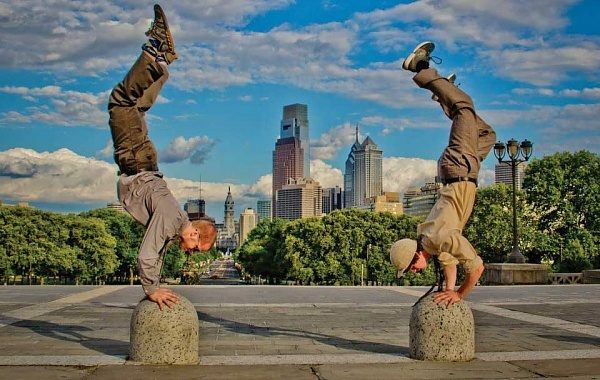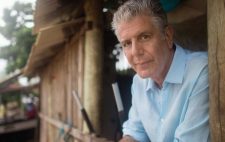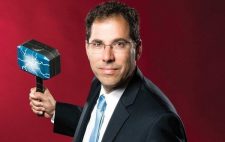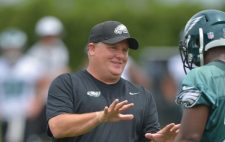The Wilczewski brothers are flying high – make that running, leaping and climbing high.
The Mount Laurel residents are competitors on this season of NBC’s “American Ninja Warrior,” the reality show competition that pits contestants against gravity-defying, jaw-dropping obstacle courses by using the discipline of parkour, or speed running and jumping. The courses aren’t easy, but Chris and Brian Wilczewski love the thrill of the run.
“You know in life when you have a really good day, and everything seems to flow perfectly, and you’re just like, ‘This day is awesome! Nothing can go wrong,’” says Chris, the elder of the two at 25. “That’s how I feel when I’m moving through the course – it feels natural and it feels right.”
The brothers were just two of the thousands of contestants who tried out for season six of “American Ninja Warrior.” They advanced through the televised qualifying rounds in St. Louis. Next, they head to Las Vegas for the finals, where a $500,000 grand prize and the title of America’s Ninja Warrior await the winner. But first, they’ve got to face Mount Midoriyama – the American obstacle course modeled on the Japanese course of the same name. Only three men have ever completed the massive 70-foot steel structure, none of them American.
So what exactly is parkour – the discipline that has to be understood and used to be a Ninja Warrior?
“In the simplest terms, it’s the art of movement,” explains Brian, 22. “Movement that involves running, jumping and climbing. Essentially, you try to find the quickest way through your environment.”
The brothers stress that parkour is more than just a bunch of kids jumping off buildings.
“Some people only see the end result, which is the movement, jumping over things and flying over obstacles, which looks really cool,” Chris says. “But they don’t see the technical aspect and the science behind it.” He cites a study from National Geographic Channel’s “Fight Science,” in which free runner Ryan Doyle jumped off a 15-foot platform, landed and executed a perfect somersault – and the force of his impact was equal to the force of an average person doing a jumping jack. “The science and technique that goes into it is unreal. That, to me, proves this isn’t people just jumping around.”
The brothers first involved themselves in parkour by watching videos and studies like the one from “Fight Science.” Brian showed Chris a YouTube video of parkour in high school and urged Chris to try it. The two have been jumping around SJ ever since – they cite the bunkers at Fort Mott in Pennsville as a particular favorite location for vaulting and training. Parkour started as a hobby for them – but grew to a calling.
“I think our mother was terrified, and our father was skeptical at first,” Chris says. “As time progressed, they saw what it meant to us, and they saw that it isn’t as risky as it’s perceived on television.”
The brothers found they had a talent for parkour, and Chris auditioned for “American Ninja Warrior” as soon as he turned 21 (the youngest age allowed).
“The fact that they accepted me – it was like, well I’ve at least got to try it,” Chris says. “It was a what-if scenario, and I just went with it.”
He found success – he is a two-time finalist (so far) and was the youngest captain of the boot camp featured on the show. Brian was quick to follow in his brother’s footsteps, and tried out as soon as he was old enough. But Chris and Brian both fell last season, and Brian’s fall in particular hit hard.
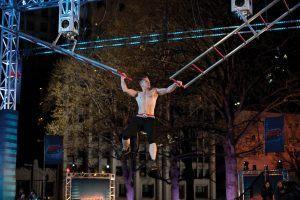 “Last year, I made it to Mount Midoriyama as a rookie, but I fell on the first obstacle,” he says. “I feel that I underperformed.”
“Last year, I made it to Mount Midoriyama as a rookie, but I fell on the first obstacle,” he says. “I feel that I underperformed.”
Falling is an inevitable part of parkour – but that doesn’t make it any easier.
“I still take it pretty hard,” Brian says. “I went through the five stages of grief in like a week. Anger, denial, blame the course, blame the guys, blame my shoes. I get over it, but the week after I fall you probably don’t want to be around me.”
So this year, the brothers are focusing on pushing themselves to new personal bests.
“The personal accomplishments in parkour, I think more than any other sport, are great,” Brian says. “I love it not because it’s easy, but because once you get an obstacle and understand it, it’s very rewarding.”
The two have come to be known by their fellow competitors as “The Brothers.” They are the only brothers in the history of the show to make it to the Vegas finals, something they relish.
“We love to see each other get further and further,” Chris says. “It’s kind of like when we were younger, it was nicer to have two birthday parties, because whatever he got I could play with, too. If he goes down early, I’m still standing. If I go down early, he’s still standing.”
“We’re doubling our odds,” adds Brian.
In order to stay fit for the intense competition, the Wilczewskis train for three to four hours every day – and in the month or so before the Ninja Warrior season begins, they up their training to six hours a day. They lift weights, run distance and practice obstacle courses they might face on the show.
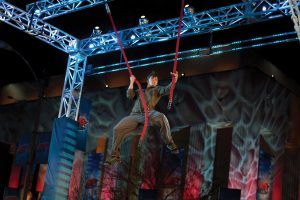 “You really have to include every kind of training, because you never know what they’re going to throw at you,” Chris says. “You have to be strong, coordinated. You only have one shot at it, so you have to be focused and in control the entire time.”
“You really have to include every kind of training, because you never know what they’re going to throw at you,” Chris says. “You have to be strong, coordinated. You only have one shot at it, so you have to be focused and in control the entire time.”
Part of the preparation is mental, and the Wilczewskis have traveled the country training with professionals and attending seminars on parkour. They even trained with French athletes credited with inventing and defining the principles of parkour.
“Each obstacle is engineered to be defeated, you just have to know the technique,” Chris says, adding that when he walks up to start a course, he feels a mix of adrenaline and fear. “Usually, what’s running through your mind is ‘Don’t fall on the first thing, don’t fall on the first thing.’”
The brothers took their training to the next level when they opened their own parkour gym in Hainesport. Owning the gym has led to another part of their lives that they never saw coming – a transition from competitor to coach. Both Chris and Brian work as instructors in parkour and movement classes – and the students range from young children to their own father.
“We’d invite friends that we met from the show to come over and try the obstacles,” Chris says. “And as I was showing them how to do it I realized I had a real knack for style and technique. I can see exactly what needs to be done and how it needs to be done. I think I can communicate that well to others.
“I didn’t want to take on the responsibilities of running a business at the time we bought the gym,” he continues. “I was a 21-year-old still taking college classes. But because the opportunity presented itself, and because my friends and the people I had started training believed in me and wanted to see the gym grow, I couldn’t let them down. We took it on for them.”
The Wilczewskis say their students provide the motivation to keep them competing – even when they think about quitting parkour for good. Both brothers just graduated – Chris with a degree in marketing from Rowan University and Brian with a degree in mechanical engineering from Rensselaer Polytechnic Institute in Troy, New York – and are uncertain of how many more seasons of the show they’ll attempt.
“I’m hoping to compete a couple of more years, until my students get there. My goal is to run with one or two of my kids and do just a little bit better than them,” Chris laughs. “Then I’ll hang it up.”
Brian is unsure of how long he’ll compete after Chris retires from “American Ninja Warrior.” “It would depend on why he stopped. If he stopped because it was time and he wanted to stop, then that would be cool and I’d probably stop too. But if he went out with some dramatic injury, I’d probably go on to avenge him.”

